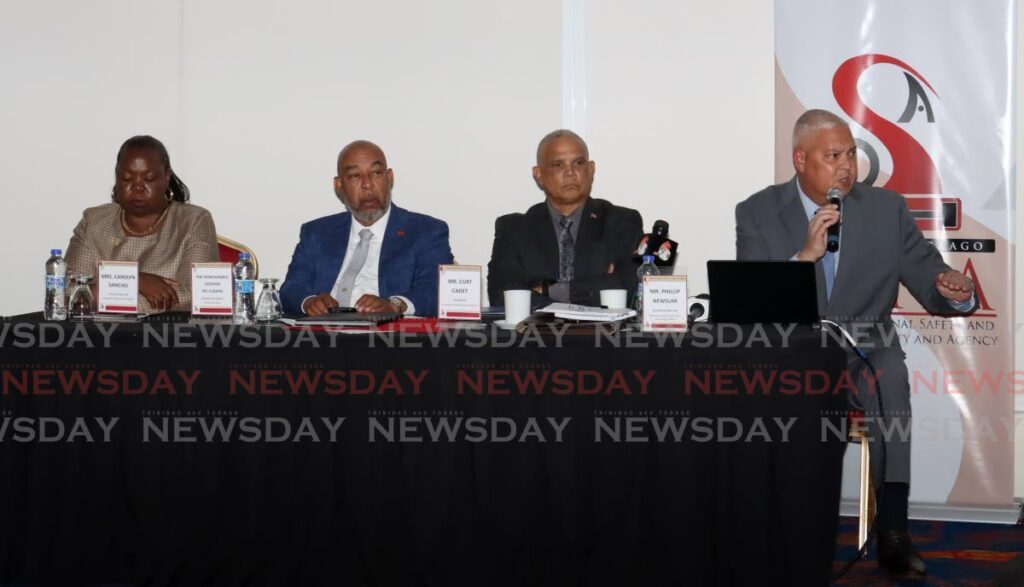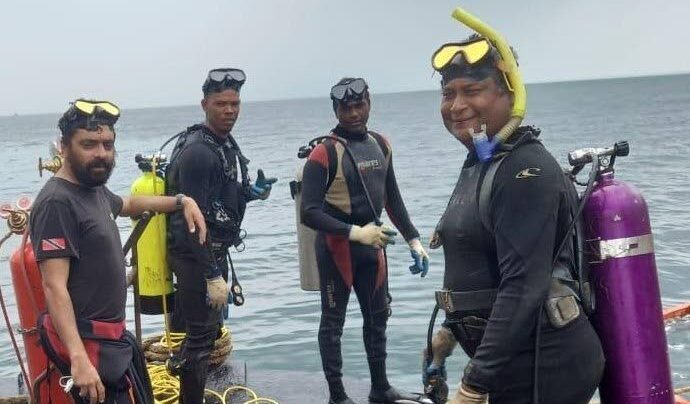US expert: Death of Paria divers 'avoidable'

Describing the death of four divers in Pointe-a-Pierre in February 2022 as “avoidable,” US-based diving expert Phil Newsum praised the government and the Occupational Health and Safety Authority (OSHA) for trying to implement diving regulations in Trinidad and Tobago.
He made the comment as OSHA hosted a public stakeholder consultation on a draft policy for the creation of the regulations.
On February 25, 2022, Kazim Ali Jr, Rishi Nagassar, Fyzal Kurban, Yusuf Henry and Christopher Boodram were sucked into a 30-inch pipeline they were repairing at a facility belonging to state-owned Paria Fuel Trading Company.
Only Boodram got out alive.
Paria’s general manager, Mushtaq Mohammed, and operations manager Colin Piper, as well as the head of Land and Marine and Construction Services (LMCS), Kazim Ali Snr, have appeared in court to answer charges arising from the incident.
Newsum is also the executive director of the Association of Diving Contractors International (ADCI) – an organisation that works with countries and regulatory agencies to establish uniform safe standards for commercial divers, and encourages industry-wide observance of these standards.
Newsum said the Paria incident was unfortunate and should not have happened.
“I think the first word that comes to mind is avoidable. It's known throughout industry that the use of scuba for commercial applications should be very, very limited, especially the scuba that these gentlemen were using. Half-masks and no communications on the divers themselves to be able to communicate with the topside environment.
"Also, scuba should not be used for any offshore applications. It's something that should be very limited and there's plenty of documentation and plenty of lessons learned to be able to substantiate that.”
Newsum was reluctant to say any particular person or entity was at fault, saying there was a lot of blame to be shared.
“Should the divers at some point have looked and said, ‘Hey, how do guys throughout the industry perform operations like this? What type of equipment are they using? Are they using recreational scuba equipment?’
"Most commercial divers that I know out there are up to speed on what is the requisite equipment they should be using for the tasks that they've been assigned.
“And then, of course, the contractors and what they should have been aware of in terms of the requisite equipment that should have been used and the current industry standard.
"Also, the folks that are paying the money should not have put themselves in a position where they're so exposed to be able to just assume that the contractor or the divers know the best and safest way to conduct the operation.
"So really, blame goes across the spectrum.”

During a question-and-answer session, one of those attending, who did not give his name, said safety should incorporate observations and not follow guidelines blindly as he advocated for the occasional use of scuba equipment in commercial diving.
He pointed to an example in Jamaica in which the air supply line for a diver using tethered diving equipment became entangled in debris floating in the water, while he was repairing a jetty after a hurricane.
He said additional divers had to enter the water and free him.
He also said there was an incident in which another diver’s tether cable became entangled in the propellers of a boat.
But Newsum said those were one-in-a-million scenarios and untethered scuba diving in the commercial diving industry was not considered safe.
“The untethered use of scuba for underwater ship husbandry is probably the largest initiative globally that international oil and gas producers and industry diving forums have been tackling, because that is where we have seen the greatest number of fatalities. You don’t know where the diver is, the diver can get lost under the vessel, and there are some divers we still haven’t found yet because they were untethered and lost while using scuba.”
Labour Minister Stephen Mc Clashie repeated Boodram’s name and those of the four dead divers and urged stakeholders to “never forget” their names.
“We must ensure that no new names are added to those I have just called. Today’s exercise is crucial in not ever having to call a name for family members, friends, or co-workers to remember as having gone because we did not have the proper rules, regulations and processes.”
Policy talks 'wonderful start'
Speaking with the media at the consultation, Newsum said the stakeholder discussion on the draft policy is “a wonderful start” to developing regulations, especially after the Paria incident.
“To bring in all of the stakeholders to be able to be a part of it, so that it is more of a consensus, as opposed to something that's just mandated by a small few. It is even better to bring in folks such as myself, or anyone else that they deem as an industry expert, to help in this initiative.”
Mc Clashie and OSHA chairman Curt Cadet both reminded stakeholders the regulations are not “merely guidelines.”
“They are pivotal for safety at work, particularly in high-risk activities and industries, and of course they are legally binding,” said Cadet.
Mc Clashie said, “Think of the regulations not just as rules but crucial pillars that ensure well-being, protect lives and uphold the dignity of each individual.”
Newsum said stakeholders should begin to focus on constantly reviewing and updating the regulations.
“The contractors and the divers, as well as the regulators (should) come together on a regular, routine basis until this guidance document is completed and finalised. And then, after it's completed and finalised, they must look at how is it working for (them), does it fit? Are folks circumventing certain portions of it, as opposed to adhering to all of it?
"All of those things need to be taken into account, and that can only happen through continued engagement on a monthly basis.”
He said the discussions should not be wasted and encouraged stakeholders to continue moving forward regardless of the pace of implementation.
“It sounds like a lot of time, it sounds very onerous, but these things should be done. It should be sponsored by maybe a series of contractors or end users, because it can't be expected that the government will pay for meeting rooms and venues like this. It has to be a shared initiative, and that's where you will make the most movement and really make the biggest difference.”

Comments
"US expert: Death of Paria divers ‘avoidable’"